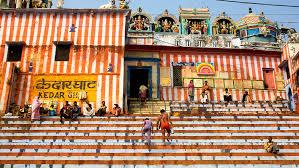Moksha, which is derived from the Sanskrit word mukti, means liberation or freedom from the cycle of birth and death. It is the ultimate goal of Hinduism, for which a person strives to attain throughout their life. In mythology, Lord Shiva is said to have attained moksha in the holy city of Varanasi. As a result, Varanasi is considered one of India's holiest places and a popular destination for Hindu pilgrims seeking moksha.

The concept of moksha is closely associated with karma, which is the belief that a person’s actions in this life determine their fate in the next life. According to Hinduism, a person’s karma is stored in their soul and decides the circumstances of their future reincarnations. A person must purify their soul of all its karmic baggage to achieve liberation from this cycle. This can be done through meditation, prayer, and other spiritual practices.
It is believed that those who die in Varanasi have a higher chance of attaining moksha than those who die elsewhere. The city is said to be blessed with a powerful spiritual energy that helps purify the soul and release it from the cycle of birth and death. By dying in Varanasi, a person’s soul is said to be released from its karmic bondage and ascend to a higher plane of existence.
However, it is important to note that, while dying in Varanasi may increase a person’s chances of attaining moksha, it is not a guarantee. To achieve liberation, a person must lead a life of virtue and perform good deeds. This means that even if a person dies in Varanasi, they must have accumulated enough good karma in order to ascend to the next level of existence.
Furthermore, it is important to remember that moksha is not a physical destination, but a state of being. It cannot be attained by simply dying in Varanasi, but rather through a lifetime of spiritual practice and devotion. While dying in Varanasi may help a person on their path to moksha, it is ultimately up to the individual to purify their soul and lead a virtuous life to reach liberation.